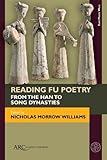Reading Fu Poetry : From the Han to Song Dynasties / ed. by Nicholas Morrow Williams.
Material type: TextSeries: East Meets West: East Asia and Its Periphery from 200 BCE to 1600 CEPublisher: Leeds : ARC Humanities Press, [2022]Copyright date: 2021Description: 1 online resource (226 p.)Content type:
TextSeries: East Meets West: East Asia and Its Periphery from 200 BCE to 1600 CEPublisher: Leeds : ARC Humanities Press, [2022]Copyright date: 2021Description: 1 online resource (226 p.)Content type: - 9781641894913
- 895.11/04 23
- online - DeGruyter
| Item type | Current library | Call number | URL | Status | Notes | Barcode | |
|---|---|---|---|---|---|---|---|
 eBook
eBook
|
Biblioteca "Angelicum" Pont. Univ. S.Tommaso d'Aquino Nuvola online | online - DeGruyter (Browse shelf(Opens below)) | Online access | Not for loan (Accesso limitato) | Accesso per gli utenti autorizzati / Access for authorized users | (dgr)9781641894913 |
Browsing Biblioteca "Angelicum" Pont. Univ. S.Tommaso d'Aquino shelves, Shelving location: Nuvola online Close shelf browser (Hides shelf browser)

|

|

|

|

|

|

|
||
| online - DeGruyter The Crusades Uncovered / | online - DeGruyter The Materiality of Middle English Anchoritic Devotion / | online - DeGruyter The Global North : Spaces, Connections, and Networks before 1600 / | online - DeGruyter Reading Fu Poetry : From the Han to Song Dynasties / | online - DeGruyter The Circuit of Apollo : Eighteenth-Century Women’s Tributes to Women / | online - DeGruyter Epic Landscapes : Benjamin Henry Latrobe and the Art of Watercolor / | online - DeGruyter Grant Wood’s Secrets / |
Frontmatter -- CONTENTS -- ACKNOWLEDGEMENTS -- PREFACE -- Chapter 1 INVENTING THE FU: SIMULATED SPONTANEITY IN SIMA XIANGRU’S “GREAT MAN” -- Chapter 2 A PROBLEMATIC FU OF THE WESTERN HAN: THE “SHU DU FU” ATTRIBUTED TO YANG XIONG -- Chapter 3 A RECLUSE’S FRUSTRATION? RECONSIDERING YU XIN’S (513–581) “FU ON A SMALL GARDEN” -- Chapter 4 YUEFU AND FU: WANG BO’S NEW PROSODY FOR “SPRING LONGINGS” -- Chapter 5 LI QINGZHAO’S RHAPSODY ON CAPTURE THE HORSE -- BIBLIOGRAPHY
restricted access online access with authorization star
http://purl.org/coar/access_right/c_16ec
The fu genre (or “rhapsody” in English) is one of the major genres of Chinese poetry throughout imperial history. This volume presents close readings of representative works in the genre, spanning over a millennium of its history. Each chapter contains a complete translation of major fu poems, accompanied by an essay presenting the work or works in historical context and also examining their significance in contemporary culture. Ranging in style and topic from the exuberant accumulation of detail in Yang Xiong’s “Shu Capital,” translated by David R. Knechtges, to the luscious lyricism of Wang Bo’s “Spring Longings,” translated by Timothy W. K. Chan, the poems present a panorama of how the genre has been used for both personal and social expression. While the individual essays examine their respective subjects in depth and detail, collectively the essays also offer a sweeping survey of the fu genre from the Han (206 B.C.E.–220 C.E.) through the Song (960–1279 C.E.) dynasty.
Mode of access: Internet via World Wide Web.
In English.
Description based on online resource; title from PDF title page (publisher's Web site, viewed 26. Aug 2024)


